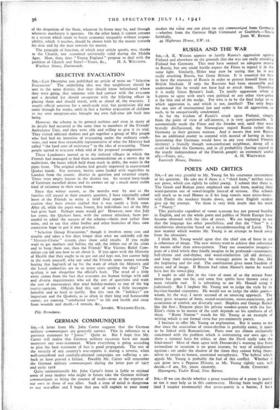SELECTIVE EVACUATION SIR, —Last December you published an article of mine
on "Selective Evacuation." The underlying idea was that neighbours should be sent to the same district, that they should know beforehand where they were going, that someone who had contact with the evacuees and a detailed list should co-operate with the billeting officer in placing them and should travel, with or ahead of, the evacuees. I sought official sanction for a small-scale trial, but permission did not come through for weeks, until in fact a further evacuation of children to my own reception-area brought my own full-time job back into being.
However, the scheme in its general outlines and even in many of its details had occurred at the same tune to members of the Friends' Ambulance Unit, and they were able and willlng to give it its trial. They visited selected shelters and got together a group of fifty people who had had no intention of evacuating under the ordinary condi- tions, and were thus reasonably representative of what the Ministry had called "the hard core of resistance" to the idea of evacuating. These people agreed to evacuate when told of the proposed arrangements These Londoners moved m to the isolated villages in which the Friends had managed to find them accommodation on a snowy day in midwinter, the buses which held them stuck in drifts, the water in the pipes froze. The original scheme had greatly improved in experienced Quaker hands. For instance, lorries came loaded with vegetables to London from the countr- district in question and returned empty. There were empty houses in the district too. So several lorry-loads of furniture travelled down and its owners set up a much more stable kind of existence in their own home.
Since that winter season, as the months wen by and as the families still stayed in their country quarters, I have repeatedly asked leave of the Friends to write a brief final report. With infinite caution they have always replied that it was surely a little soon. After all, while the pipes were frozen, five individuals out of the fifty had gone back. Perhaps more would go? However, now that July has come, the Quakers have, with the utmost relutance, been per- suaded to admit the success of the scheme—theirs now rather than mine, and to say that other bodies and other branches of then own connexion hope to put it into practice.
"Selective Group Evacuation," though it involves more care and trouble and takes a few days longer than what we unkindly call the " Mystery-Cruise " system, does show solid results. If you really want to get mothers and babies, the old, the infirm out of the cities and to 'keep them out, then the Friends' War Victims Relief Com- mittee can tell you how to set about it. If you agree wtih the Ministry of Health that they ought to oe got out and kept out, but cannot help in the work yourself, why not send the Friends some money towards buying that hap'orth of tar for the want of which the Ministry and the Local authorities are in so many cases spoiling the ship? The spoiling is not altogether the official's fault. The need of a little extra comes from the fact that evacuees are human beings with odd and diverse requirements who ask the sort of questions and want the sort of reassurances that send holiday-makers to one of the big tourist-agencies. Officials find this sort of work a little incompre- hensible and so hard to justify. But this time the " holidays " are important and the Quakers, as so often in their long and honourable career, are running "conducted tours" to life and health and away from wounds and death.—I remain, &c.,


























 Previous page
Previous page